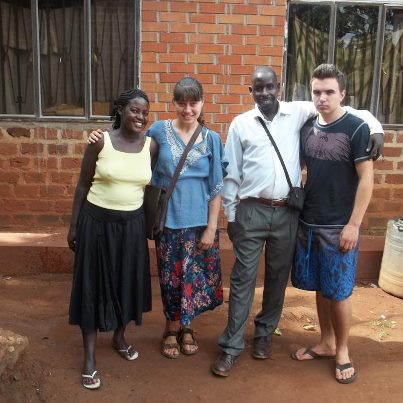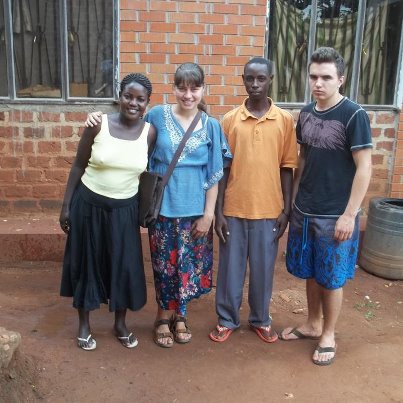
|  JUDAN VOLUNTEERS UGANDA ( JUDAN SAY YES CHILDREN'S CENTRE JUDAN VOLUNTEERS UGANDA ( JUDAN SAY YES CHILDREN'S CENTRE
 With God every thing is possible With God every thing is possible
|
|
 |

Volunteering is a great way to advance a cause, support an organization, and make a difference in our community. It can also be an opportunity to meet new people, learn new skills. If you'd like to give something besides money, consider lending your time and talents to JUDANSCC that are important to you.
Applying to be a JUDANSCC volunteer is simple, just contact us by clicking here Volunteer Positions Available
* Program Coordinators
Home Support Visit to HIV positive clients (women children)
* Teachers
* Business Educator/Consultant (women empowerment in Business Development and many others )
* HIV/AIDS Educators, Youth HIV/AIDS Educators
* After class school Sports Coach
* Art, Music, Dance and Drama Trainers
How much does it cost to volunteer with

Judan Say Yes
Children's Centre
We are currently not charging any fee on our volunteers, mean time all you have to do is to organize, arrange for your journey to Judan Say Yes Children's Centre however some cost may be incurred in terms of lunch and super of around 2,3 or 1 dollars a day if one economises. Also some times the organisation may provide some assistance with meals.
For how long?
Longer volunteer/internships up to 2 years, so it depends on your choice in months to years
Do I need a college degree to volunteer?
NO, anyone can volunteer for general projects. HOWEVER - if you plan to teach in secondary (high school) grades (s1-s6) you must have a college degree, diploma in the subject you plan on teaching.
For all other projects, college level education is not required.
What age do you have to be to volunteer?
Individuals must be at least 18 years old but should be in good health. However, we sat as the management of Childline Uganda and decided to reduce as lower as 14 years since we have got clients of the same age range, it will create an impact in their lives. So now we accept volunteers of age range 14 and on wards/plus.
What immunizations/vaccinations will I need?
When travelling to any international developing area we suggest (NOTE: some are legally required by country):
* Yellow fever vaccination (legally required to enter Uganda and to obtain a Visa),
* Diphtheria (optional),
* Polio (recommended),
* Hepatitis A & B (OPTIONAL - Hep B is only needed if volunteering in a public health project),
* Typhoid (recommended),
* Rabies (OPTIONAL),
* Tuberculosis (recommended),
* Malaria (needs to be closely discussed with doctor),
* Tetanus (recommended), and
* All childhood immunizations should be current.
What is a typical work day?
Project work is normally Monday-Friday; hours vary from 5-6 hours per day. The total hours that you are expected to be "on the job", in various activities, is 20-30 hours per week.
Who organizes my country Visa for my volunteer placement?
If Visa's are required based on your country of origin, you should organize your Visa through a travel agent or independently - visit the Ugandan embassy website for more information. In Uganda, for citizens of most countries, you can do this at the airport when you arrive or before you get to Uganda. Currently, Visa's cost US$50 (Bring a $50US bill, dated 2003 and above).
Do I need travel insurance?
Travel insurance is recommended. This should be purchased above and beyond any healthcare insurance you may have
What should I bring with me?
A detailed volunteer guide along with a checklist will be provided once you have registered for a project and have sent us flight details.
How safe is it to volunteer internationally?
The Ugandan people are very warm and friendly towards foreigners, so you will be well looked after. Uganda has a democratic electoral process and mixed macroeconomic conditions. However, you should use common sense as you would be anywhere, particularly in Kampala or its surrounding districts.
What is the climate like in Uganda?
Although the country lies on the equator, most of Uganda is on a plateau 3,600-6,000 ft/900-1,830 m above sea level. Temperatures in some parts of the country can vary quite a bit (high 60's-90's) owing to the country's high altitude, depending on the season.
Who organizes my flights?
YOU are responsible for all travel costs; however, we are happy to offer assistance when making international travel arrangements. A few cheap airfare internet sites can be accessed below:
* Farecompare.com - http://www.farecompare.com/
* Expedia.com - http://www.expedia.com
* orbitz.com - http://www.orbitz.com
* kayak.com - http://www.kayak.com/
What are the living arrangements when volunteering?
All accommodations will be provided in a dorm/organisation quarters.
Most villages are rustic and may not provide running water or electricity. Latrines are squat pit latrines and showers are warm water bucket showers located outdoors
Accommodations are in a dorm setting with up to3/4 volunteers in a room
Can groups (e.g. family, church, college) volunteer together?
YES, we have various projects that can support group work.
However we request that group arrangements be made a minimum eight (8) weeks in advance. For groups with children, we recommend children be at least 12 years old.
Do I have to be from the United States?
NO, we accept volunteers from all over the world.
Which countries do most of your volunteers come from?
The majority of our volunteers come from the USA, Netherlands, china, Brazil, Japan, Kenya, Tanzania and Rwanda
Do I need to speak English to become a volunteer?
YES, however, you may have English as your second language, if you speak Swahili this will be taken into consideration when in need for teaching positions.
Judan Say Yes Children's centre Volunteer Preparation Guide
· What clothes should I pack for my trip?
· What general supplies should I pack?
· What medical supplies should I pack?
· What about money?
·
Other important things to remember…
What clothes should I pack for my trip?
WOMEN'S/GIRL'S CLOTHING
1 pair of sturdy shoes or walking boots for hiking
1 pair of sandals (flip flops) to use at the guest house and showering at the project site
3-4 pair of socks (cotton)
5 pair of underwear (cotton)
2 bras
1 fleece sweater or light jacket , 1 swimming suit (for weekends)
1-2 pair of long casual trousers (jeans or khakis’)
3-4 casual short sleeve or sleeveless blouses
2 long sleeve casual blouses , 3-4 long skirts (shorts are not recommended as they are offensive in rural areas) ,1 rain coat
1 hat
(THIS IS VERY IMPORTANT FOR SUN PROTECTION)
MEN'S/ BOY'S CLOTHING
1 pair of sandals (flip flops) to use at the guest house ,1 pair of sturdy shoes or walking boots for hiking , 3-4 pair of socks , 5 pair underwear (cotton) 1 fleece sweater or light jacket , 2 long sleeve casual shirts , 1-2 pair casual trousers or jeans , 1-2 pair of shorts , 1 belt , 1 swimming suit , 3-4 t-shirts , 1 dress shirt (tie optional) ,1 rain coat , 1 hat (THIS IS VERY IMPORTANT FOR SUN PROTECTION)
What general items should I pack? , Your Up to date passport
You will need a Visa to get into Uganda (purchased at point of entry – e.g. Entebbe Airport in Uganda)
Good pair of sunglasses
A good camera (digital is best)
Extra batteries (rechargeable)
An alarm clock (travel)
A good backpack (for short camping/travel trips)
A small lock (combination are best)
Gifts for schools / orphanages (best purchased here in Uganda - e.g. books, school supplies, candies, clothes, toys can be purchased for little money in Kampala) , Small games (cards etc .. ) , For people who wear glasses or contact lenses, it is advisable that you take some spare ones and cleansing solutions. , Sun block (SPF 45 or higher) , Insect repellent , 1 compact travel umbrella , Towel, wash cloth, hand towel Headlamp or torch
Toilet Bag: Most items (shampoo, soap, toothpaste, deodorant, razors, etc.) can be easily purchased here including feminine hygiene products (sanitary pads).
What medical supplies items should I pack? , Mosquito repellent , Malaria tablets ,Antiseptic cream/gel , Plasters (band-aids) ,Wet wipes , Sun cream - High factor at least 30-45 , Anti-diarrhoea tablets (Imodium) ,Laxatives , Midol (for women) Rehydration salts or sport drink mix (Gatorade) for dehydration , Iodine tablets , Ibuprofen (Advil) for pain relief
Ear plugs (optional) , If you use prescribed medicine, you must take enough to last the time you will spend in Africa
What about money?
Uganda for the most part is cash based society. Here and there you can use your credit card, (Visa cards most readily accepted, Master Card is next, but not Discover Cards and or American Express) and usually it means 6 to 8 or more% surcharge for the privilegehttp://kabiza.com/Ugandantravel.htmfor using your card (due to fees that are incurred by merchant in Uganda). That means one needs cash while in the country. Many hotels, safari companies and airlines will ask for US dollars. Uganda Shillings will be accepted in many cases instead, not always at market exchange rate.
Traveller Cheques are often harder to cash and are cumbersome requiring extra fees in banks. Most Forex Bureaus will not take traveller cheques from you. Below are some tips that will make your visit to Uganda smoother.
US Dollars are the currency of Choice:
Entry VISA and most permits such as the ones for gorillas must be paid in US Dollars. Euros and UK Pound are ok for changing money into Ugandan currency. It is important that you obtain dollar bills (50’s or 100’s) newer than 2003 and no tears or blemishes on them. This helps your exchange rate and getting them accepted. (2012is due to forgeries in times past)
NOTE: small US bills (5, 10, and 20’s) are not normally accepted or bring a much lower exchange rate.
Forex Bureaus are readily available in the downtown area of Kampala: There are plenty of exchange offices located around Uganda with varying rates.
Banks:
You can always exchange money at a bank and it might take a bit longer and in most cases you will get a lower rate. You can use your credit card to get cash at banks (Barclays is the fastest and the cheapest), however it may take a bit of time. You can also change your traveller cheques (American Express are best – but not advised) there - you will need proof of purchase and passport to prove ownership of cheques you want cashed.
ATM Machines:
If you have a visa debit card it is easy to use ATM’s around Kampala and in some areas outside of Kampala. You can get the best rate from your country's currency converted into Shillings in most cases you can take out 700,000sh per day. You can also use a visa credit card if you have a pin number...alert your bank that you will be doing withdrawals in Uganda otherwise you will not get any money out of the machine.
Traveler Cheques: (NOT ADVISED) Use American Express ones only. All others you will have a harder time getting money or no money at all. You will pay a fee for exchanging them into money. Plus in spite of suggestions from American Express you will need proof of purchase and passport to prove ownership checks you want cashed.
For more detailed information visit a few of these sites:
Wikipedia/Uganda - http://en.wikipedia.org/wiki/Uganda
Uganda Embassy - http://www.ugandaembassy.com/
Uganda Tourist Board -http://www.visituganda.com/
Lonely Planet - http://www.lonelyplanet.com/uganda |
|
|
|
|
|